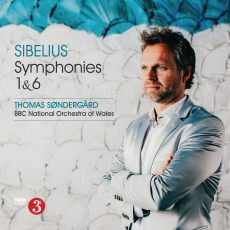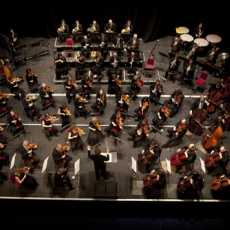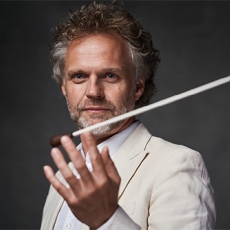Thomas Sondergard - Sibelius: Symphonies 1 & 6 - MusicWeb International
This is the second instalment of the Sibelius cycle that Thomas Søndergård is recording for Linn with the BBC National Orchestra of Wales.
I thought a suitable comparison for these performances would be the ones which have most recently come into my collection, namely those by the Minnesota Orchestra and Osmo Vänskä. That said, I’m not quite comparing apples and apples. The Vänskä performances aren’t coupled together: he couples Symphony No I with No. 4 (review) while the Sixth comes on a very full disc that also includes the Third and Seventh symphonies (review).
Søndergård’s account of the First Symphony begins promisingly with a reading of the first movement that has plenty of fire and Romantic surge. The Danish conductor also distils a good atmosphere in the quieter passages (e.g. from 9:30). I’m afraid that Vänskä has never convinced me in this movement, whether in his latest recording or his earlier Lahti performance. In his desire to imbue the music with urgency he presses the tempo excessively in the Allegro energico; indeed, I don’t think I’ve ever heard it so swiftly played. The music sounds impossibly rushed at times but that’s not the case with Søndergård. Vänskä’s Minnesota reading is nearly two minutes faster than Søndergård takes. However, in the slow movement the tables are turned completely. At the start Søndergård’s performance is very hushed, which is good, but it’s also very steady, which is less convincing. Other passages in the movement fare better and the orchestra plays very well for him. However, this opening – and the reprise of the material at the end – are just too much of a good thing. Turn to Vänskä and you also find expressive playing but the opening and close of the movement have a much more pleasing sense of flow: in comparison I’m afraid Søndergård, for all his beauty of utterance, sounds sluggish.
Both conductors lead exciting accounts of the brief Scherzo. The rhetorical opening of the finale is well done by both conductors but I fancy I hear a touch more grandeur from the Minnesotans. Søndergård is exciting in the Allegro molto yet he keeps the performance on a tight rein. When that wonderful second subject appears on the violins (3:26) the way the BBCNOW plays it is noble and unforced. I like the way the important harp part is balanced: we hear it in just the right proportion to the strings. I think Søndergård’s performance of the finale is very successful and, indeed, his reading of the symphony as a whole is a good one, though I can’t escape that reservation over the second movement.
Twenty-three years separate the First and Sixth symphonies – though Sibelius began to contemplate the Sixth as early as 1918 – and what a stylistic distance the composer travelled in that time. The First Symphony is a tremendous achievement but the Sixth is more elusive and subtle and shows a very different, more experienced and questing kind of mastery.
Søndergård brings off the opening of the first movement very well, though Vänskä gives the music more breadth and finds more magic and a greater sense of inwardness in the music. When the pace picks up (2:00 in the Søndergård reading) Vänskä is marginally steadier, though not to such an extent as to be radically different. In truth, both conductors are very persuasive in the main body of the movement. In the new recording, the BBCNOW plays with great agility. The second movement is not a true slow movement; I tend to think of it as a serious Intermezzo. Søndergård does it well though I fancy Vänskä’s way with the music is a bit more searching. I like the Welsh account of the Poco vivace; it scampers along in fine fashion. For my taste Vänskä is much too brisk in the opening paragraphs of the finale; at his speed the music sounds hasty. Søndergård is just a fraction slower but that makes all the difference; I think he gets it right. After the opening (from 1:53 in the Søndergård performance) both conductors adopt a nice mobile speed, investing the music with good amounts of energy. The coda to the symphony really is marvellous, the music pure and rarefied and taking us back to the very opening of the work. Søndergård does this passage very well indeed, bringing his account of the Sixth to a highly satisfying conclusion
Overall, this is a pretty successful pairing of two very different Sibelius symphonies. Throughout the disc the playing of the BBCNOW is excellent. They’ve been expertly recorded by engineers Philip Hobbs and Robert Cammidge. There’s excellent clarity to the sound and good acoustic space round the orchestra. The very good liner notes are by Andrew Achenbach.


